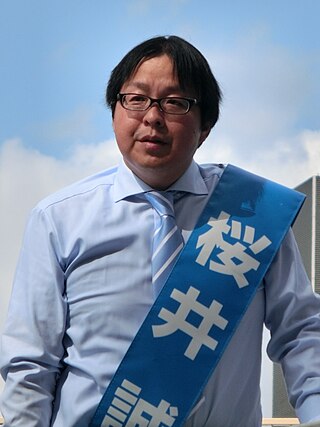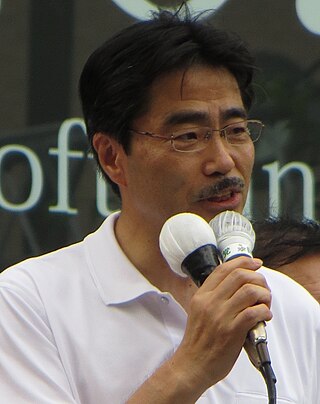
Yuriko Koike is a Japanese politician, who has served as the Governor of Tokyo since 2016. Previously, she was also served as a member of the House of Councillors from 1992 to 1993, a member of the House of Representatives from 1993 to 2016, Minister of the Environment under from 2003 to 2006, and Minister of Defense in between July and August 2007.

Nobuteru Ishihara is a Japanese politician, who served as the Secretary-General of the Liberal Democratic Party from 2010 to 2012. Previously, he also served in the House of Representatives as representative from 1990 to 2021.

The Tokyo Metropolitan Government is the government of the Tokyo Metropolis. One of the 47 prefectures of Japan, the government consists of a popularly elected governor and assembly. The headquarters building is located in the ward of Shinjuku. The metropolitan government administers the special wards, cities, towns and villages that constitute part of the Tokyo Metropolis. With a population closing in on 14 million living within its boundaries, and many more commuting from neighbouring prefectures, the metropolitan government wields significant political power within Japan.

Yōichi Masuzoe is a Japanese politician who was elected to the position of governor of Tokyo in 2014 and resigned in June 2016 due to the misuse of public funds. He was previously a member of the Japanese House of Councillors and served as the Minister of Health, Labour, and Welfare. Before entering politics, he became well known in Japan as a television commentator on political issues.

Prefectural elections for the Tokyo Metropolitan Assembly were held on 12 July 2009. In the runup to the Japanese general election due by October they were seen as an important test for Taro Aso's ruling coalition of the Liberal Democratic Party (LDP) and the New Komeito. New Komeito considers Tokyo as an important stronghold and had repeatedly asked Prime Minister Aso to avoid holding the two elections within a month of each other.

Tokyo 10th district is a constituency of the House of Representatives in the Diet of Japan. As of 2012, 351,821 eligible voters were registered in the district. The district is located in the central area of the former city of Tokyo. After redistricting in 2022 it comprises the wards of Toshima and Bunkyō. Previously it had covered Toshima and a part of Nerima ward.

Kenji Utsunomiya is a Japanese lawyer and former chair of the Japan Federation of Bar Associations.

Makoto Sakurai is the pen name of a political activist, blogger, and writer from Kitakyushu in Fukuoka Prefecture, Japan. A former civil servant in a ward office, he is the founder and former leader of the far-right nationalist group Zaitokukai, known for its anti-foreign messages and public demonstrations which some consider unruly. Following his unsuccessful campaign in the 2016 Tokyo gubernatorial election, he founded the Japan First Party in August 2016 and is currently the party's leader.

The 2014 Tokyo gubernatorial election took place on February 9, 2014 to replace outgoing Governor Naoki Inose, who resigned effective December 24, 2013. Yōichi Masuzoe was declared the winner in exit polling, with a substantial lead over the fifteen other candidates. His final tally was 2,112,979 votes (42.86%), with his two closest competitors Morihiro Hosokawa and Kenji Utsunomiya failing to break the 20% mark. Total turnout was 4,930,251 (46.14%), significantly lower than the 62.6% turnout in the 2012 election.

General elections were held in Japan on 22 October 2017. Voting took place in all Representatives constituencies of Japan – 289 single-member districts and eleven proportional blocks – in order to appoint all 465 members of the House of Representatives, the lower house of the then 707-member bicameral National Diet of Japan. Incumbent Prime Minister Shinzō Abe's governing coalition of the Liberal Democratic Party (LDP) and the Komeito party retained their seats in signs of what was perceived as weak opposition. Abe won his fourth term in office and held on to the two-thirds supermajority in order to implement policies on revising the war-renouncing Article 9 of the Japanese Constitution.

A by-election for the Tokyo 10th district in the Japanese Japanese House of Representatives was held on 23 October 2016 to replace Yuriko Koike, who vacated the seat to contest the Tokyo gubernatorial election in July 2016. Koike, a member of the Liberal Democratic Party (LDP), had represented the district since the December 2012 general election and also served a previous term from 2005 to 2009. The election was won by LDP candidate Masaru Wakasa, an incumbent member for the Tokyo proportional representation block who had supported Koike during her gubernatorial campaign. A separate by-election for the Fukuoka 6th district was held on the same day.

Tomin First no Kai is a regional political party in Tokyo, Japan.

Prefectural elections for the Tokyo Metropolitan Assembly were held on 2 July 2017. The 127 members were elected in forty-two electoral districts, seven returning single members elected by first-past-the-post, and thirty-five returning multiple members under single non-transferable vote. Four districts had their magnitude adjusted in this election to match population changes.
Kibō no Tō was a conservative political party in Japan founded by Tokyo Governor Yuriko Koike. The party was founded just before the call of the 2017 general election. The party's ideology was mainly Japanese conservatism and nationalism.

General elections were held in Japan on 31 October 2021, as required by the constitution. Voting took place in all constituencies in order to elect members to the House of Representatives, the lower house of the National Diet. As the constitution requires the cabinet to resign in the first Diet session after a general election, the elections will also lead to a new election for Prime Minister in the Diet, and the appointment of a new cabinet, although ministers may be re-appointed. The election was the first general election of the Reiwa era.

The 2020 Tokyo gubernatorial election took place on 5 July 2020 to elect the Governor of Tokyo. In a result viewed as an endorsement of her handling of Tokyo's response to the COVID-19 pandemic, incumbent Yuriko Koike was re-elected for a second term in a landslide, increasing her share of the vote to 59.7%.

Prefectural elections for the Tokyo Metropolitan Assembly were held on 4 July 2021. The 127 members were elected in forty-two electoral districts, seven returning single members elected by first-past-the-post, and thirty-five returning multiple members under single non-transferable vote. Two districts had their magnitude adjusted in this election to match population changes.
On April 28, 2024, by-elections in Japan were held in order to fill vacancies in the National Diet of Japan. In the October 27 slot, there will be at least one national by-election, for the Iwate senate seat in the 2022 class after incumbent Megumi Hirose (LDP→independent) has resigned.

The 2024 Tokyo gubernatorial election took place on 7 July 2024 to elect the Governor of Tokyo. Incumbent Yuriko Koike was re-elected for a third term, albeit at a reduced share of the votes compared to her 2016 election and 2020 re-election. Shinji Ishimaru, the former Mayor of Akitakata, exceeded expectations to place second behind Koike. Meanwhile, lawmaker Renhō, who was endorsed by the main left-wing opposition parties and was widely considered Koike's main opponent leading up to election day, significantly underperformed her polling and placed third.

Shinji Ishimaru is a Japanese politician who has served as Mayor of Akitakata from 2020 until his resignation in 2024. Ishimaru obtained national prominence as mayor in 2022 after a video of him scolding members of the city council for sleeping during a meeting went viral on social media, with the video gaining 13 million views on YouTube. Ever since then, he has gained a large internet following, especially on Twitter with his vocal political opinions and by documenting his frequent clashes with local political opponents.






















